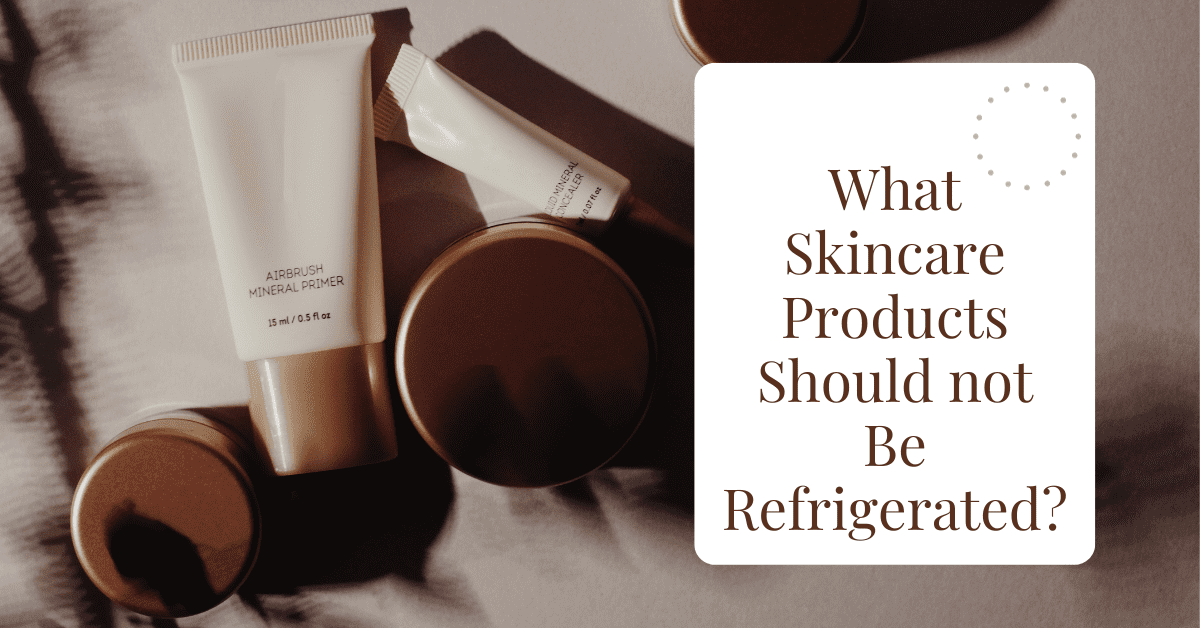Adding a skincare fridge to your beauty routine has become a popular trend in recent years. Certain compounds, such as retinol and vitamin C, have their shelf life and efficacy extended by the low temperature.
Still, not every skincare product works better refrigerated. Some may even lose their effectiveness or break down more quickly in the cold. It’s Important to Know what Skincare Products Should not be refrigerated in addition to Knowing What to Add.
In This Article
Why Refrigerate Skincare at All?
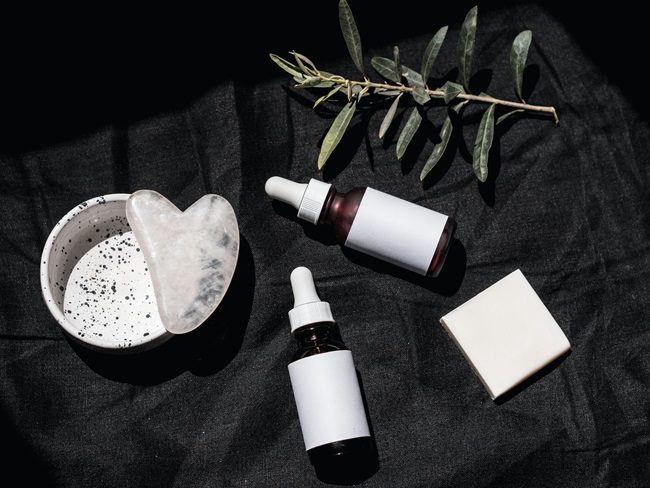
The usage of skincare refrigerators increases the stability and efficacy of temperature-sensitive ingredients. Certain components, such peptides and antioxidants, can degrade more quickly when exposed to heat, light, and air. Keeping them cold stops this early disintegration. Additionally, refrigeration inhibits the development of microorganisms that might taint your goods.
Most skincare products work best at a temperature of 4 to 8°C. This cool but not freezing temperature extends the life and potency of ingredients. It imitates the settings in which clinical trials and product development take place. Therefore, chilling allows you to experience the full range of benefits that the formulations were designed to provide.
Naturally, not all skincare products require refrigeration. It’s true that certain combinations and ingredients break down more quickly in the winter. It is essential to know which ones to keep out of the refrigerator in order to preserve their efficacy.
What Not to Put in a Skincare Fridge?
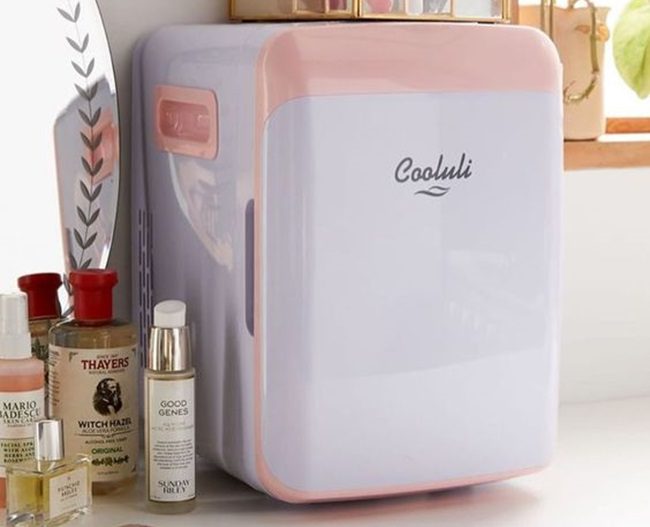
1. Oils and Products Made from Oil
Plant oils and oil-based cosmetics and balms can solidify and cloud in the refrigerator. The oils change viscosity and texture as a result of congealing and hardening in the cold.
When reheated to room temperature, they usually return to their former condition. However, over time, warming and chilling oils repeatedly might hasten their deterioration.
2. Items in Pump Bottles
Cold temperatures have the potential to influence the mechanics of pump bottles. It’s possible for the pump to stiffen up and become challenging to use. When cold, the product may potentially become too viscous to pump effectively. Pump-style products, like as cleansers and moisturizers, should be kept out of the refrigerator.
3. Silicone Products
Primer and mask made of silicone are also extremely sensitive to temperature. They get rubbery and thicken in the cold. The performance and user experience of the product may suffer as a result. For optimal results, let silicone formulations come to room temperature before using.
4. Masks of Sheet
While refreshing, keeping sheet masks in the refrigerator might cause them to dry out. Masks become stiffer and less saturated as a result of the cold air removing moisture from the cloth. When not in use, store sheet masks in a sealed container at room temperature for optimal outcomes.
5. Aluminum Containers
Refrigerating skincare products in metal tubes or containers is not recommended. Tube crimped seals may break as a result of metal contracting and warping in the cold. This jeopardizes the product’s containment and sterility. Over time, it also causes the oxidation through the damaged seals to grow.
6. Unsealed Products
Any skincare products not packaged in air-tight containers shouldn’t go in the fridge. Examples include jars with screwed lids or tubs with peel-off covers. The cold, dry air of refrigerators can evaporate the water content and stale exposed product. Tightly sealed pumps, squeeze tubes and bottles maintain freshness best.
7. Water-Based Products
Gels, serums and emulsions containing a high-water content tend to freeze or crystallize in the fridge. This gives them an altered texture that can impact application and absorption. Unless instructed to refrigerate, watery products are best kept at room temperature.
What to Put in a Skincare Fridge?
Now that you know What Skincare Products Should Not Be Refrigerated, let’s examine the skincare products that work best when refrigerated:
1. Retinol and Retinoids
In heat and light, retinol and prescription retinoids, such as tretinoin, become extremely unstable. Their potency can last up to a year when refrigerated, often lasting three months. Because of this, storing these vitamin A derivatives in the refrigerator is the best option.
2. Vitamin C
Similar to retinol, vitamin C degrades quickly in the presence of air, light, and high temperatures. Liquid vitamin C serums and emulsions kept in the refrigerator maintain the antioxidant’s efficacy.
3. Various Flower Oils and Extracts
In a refrigerator, the delicate essential oils and plant extracts such as lavender, chamomile, and rose stay fresher longer. This keeps their aromatherapeutic qualities intact.
4. Acids
Refrigerating alpha hydroxy acids (AHAs) and beta hydroxy acids (BHAs) prolongs their efficacy as exfoliants. Applying chilled formulations to the skin also feels more revitalizing.
5. Peptides
Peptides, which are combinations of amino acids, have anti-aging properties. However, they frequently have high heat and light sensitivity. Refrigeration extends the stability and useful life of topical peptide compositions.
6. Prebiotics
For maximum survival, live probiotic extracts and bacteria need cold temperatures. Refrigerating dermatological probiotic skincare products helps them maintain more active microorganisms.
7. Sunscreen
The efficacy and integrity of sunscreen components compromises, if stored at high temperatures. Refrigeration in between applications maintains antioxidant and UV-blocking properties.
How Cold Should Your Skincare Fridge Be?
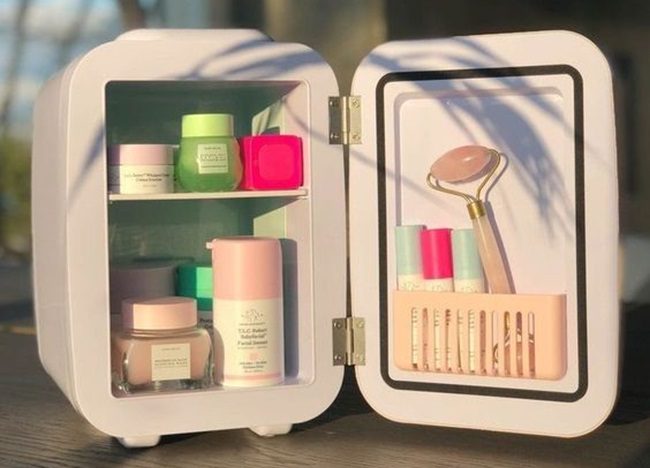
The ideal temperature range for your skincare refrigerator is 4° to 8°C. This is in line with the typical temperature of the majority of domestic food freezers. You may check the temperature inside your refrigerator by using a thermometer. The most dependably chilly shelves are usually those in the center.
Keep your skincare refrigerator away from very cold conditions, such as below freezing 0°C. It may harm certain formulations. Furthermore, avoid keeping it warmer than a food refrigerator since this might lessen the stabilizing effects. By modifying the unit’s temperature setting, the ideal 4°–8°C temperature range for skincare may be more effectively managed.
Should Skincare Be Refrigerated All the Time?
The biggest way to extend the life of your items is to refrigerate them continuously. Still, it’s not always feasible to keep everything in the refrigerator.
You should refrigerate majority of skincare products until you’re ready to use them. Before using, take the product out of the refrigerator and let it reach room temperature. Applying ice directly to the skin might cause discomfort and hinder the absorption process.
The best results come from regularly refrigerating serums and moisturizers that include heat-sensitive components like vitamin C and retinol in between usage. However, even non-fridge items will survive longer if stored in dark, cold locations like drawers while not in use.
You may also like- Mary Kay Skin Care Routine: A Step-by-Step for Glowing Skin
How Long Does Skincare Last in the Fridge?
Skincare items can last much longer in the refrigerator than the manufacturer’s stated expiration date. The following broad recommendations will help you extend the shelf life of essential ingredients:
- Vitamin C: 9-12 months refrigerated vs. 2-3 months unrefrigerated.
- Retinol: Up to 2 years refrigerated vs. 3-6 months unrefrigerated.
- AHAs/BHAs: 2+ years refrigerated vs. 1 year unrefrigerated.
- Natural Oils: 1-2 years refrigerated vs. 6-12 months unrefrigerated.
- Sunscreens: Up to 1 year refrigerated vs. 6-9 months unrefrigerated.
Naturally, no refrigerator can completely prevent product deterioration. Nonetheless, regular cold storage ensures that you get the most out of your skincare expenditure.
Be alert for changes in the way that refrigerated products work, feel, and smell. It might be expired even after being refrigerated if it appears less effective or spreads unevenly. Replace complex serums and actives within the manufacturer’s recommended time frame if in doubt.
REcommended– Unlocking the Truth: Does Creatine Expire? Unveiling the Shelf Life
Guide to the Best Skincare Fridges Brands
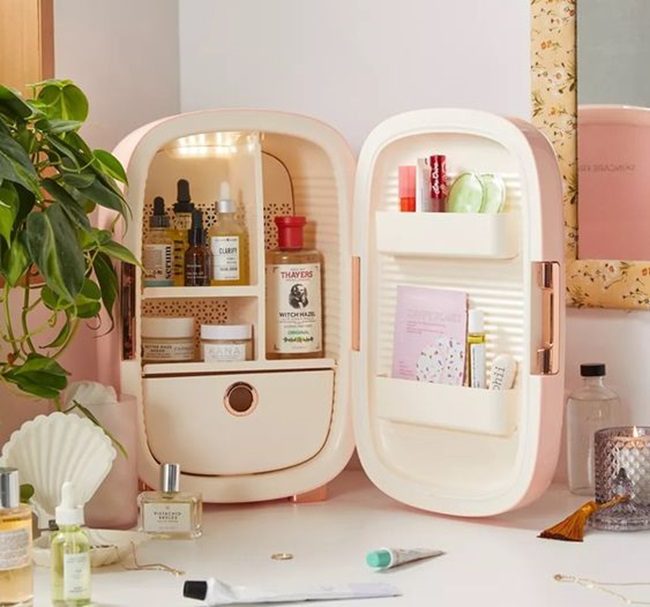
1. Cooluli
One of the most well-known micro fridge brands for skincare products is Cooluli. Provide a variety of shapes and sizes, many having attributes unique to beauty. good management of temperature.
2. Chefman
Dependable brand that produces small micro fridges perfect for storing skincare products. Frequently more affordable choices.
3. FaceTory
Specializes in refrigerators made just for cosmetics. tend to be more expensive but quite helpful for skincare.
4. Nutrichef
Produces premium small refrigerators with a variety of dimensions, temperatures, and designs. useful for various purposes and skincare.
5. IGLOO
Renowned for producing dependable and long-lasting micro refrigerators. Skincare models such as the IGL35T are suitable.
Related– How to Use Coconut Oil for Skin Whitening? Best Ways
FAQs Related to “What Skincare Products Should Not Be Refrigerated?”
Can you put serums in a skincare fridge?
Yes, cold storage is beneficial for many serums in order to preserve their integrity and efficacy. When serums containing vitamin C, retinol, peptides, probiotics, and acids are cooled, they retain their stability and efficacy for a longer period of time.
What skincare should be refrigerated?
To answer what skincare products should not be refrigerated, Products containing heat and light-sensitive ingredients like vitamin C, retinol/retinoids, natural oils, flower extracts, antioxidants, and probiotics generally maintain optimal freshness and performance when refrigerated.
Does retinol need to be refrigerated?
Yes, keeping retinol products refrigerated can extend their shelf life from around 3 months to over 1 year. The cold protects retinol from oxidizing and losing potency.
Can I put my moisturizer in the fridge?
You can refrigerate oil-free moisturizers, but oil-based creams may harden or separate. Let refrigerated moisturizers warm up to room temperature before applying.
What happens if you don’t refrigerate retinol?
At room temperature, unrefrigerated retinol can start losing potency after around 3 months. Without refrigeration, retinol oxidizes faster leading to decreased effectiveness.
Can you store tretinoin in the fridge?
Yes, prescription tretinoin creams and gels stay active longer when refrigerated. Keep the product sealed and stored inside your fridge between uses for optimal freshness.
Should I keep my skincare fridge on all the time?
Yes, keeping your skincare fridge on consistently maintains the ideal chilled temperature range for preservation. Turning it on and off can cause fluctuation.
How long do peptides last in the fridge?
Refrigeration can extend the shelf life of topical peptide formulas up to around 2 years. Unrefrigerated peptides may only last 6-12 months before degrading.
Does vitamin C serum need to be refrigerated?
Refrigeration helps vitamin C serums retain the highest level of potency. Chilling prevents vitamin C from oxidizing as quickly.
Do you have to refrigerate vitamin C serum?
Refrigeration is highly recommended for optimal vitamin C stability and absorption, but not 100% necessary. Keeping serums in a cool, dark place helps if refrigeration isn’t possible.
Get the Most from Your Skincare Fridge
Including a tiny fridge in your skincare routine helps preserve the strength and purity of many products. What Skincare Products Should Not Be Refrigerated? Refrigeration isn’t appropriate for many products, though. Steers clear of anything unsealed, silicone, sheet masks, metal packaging, cooling oils, and watery products.
Make sure to keep natural extracts, probiotics, acids, vitamin C, and temperature-sensitive retinol cold. For the best results, keep an eye out for any symptoms of product deterioration and replace as necessary. The advantages of your skincare routine may be amplified and prolonged with some strategic refrigeration.
Hi, I'm Naznin! I really love making skin happy. I learned cool stuff about skincare and want to share it with you! Together, let's explore how to take care of our skin and feel awesome. Join me on this fun journey where we can be our beautiful selves!

